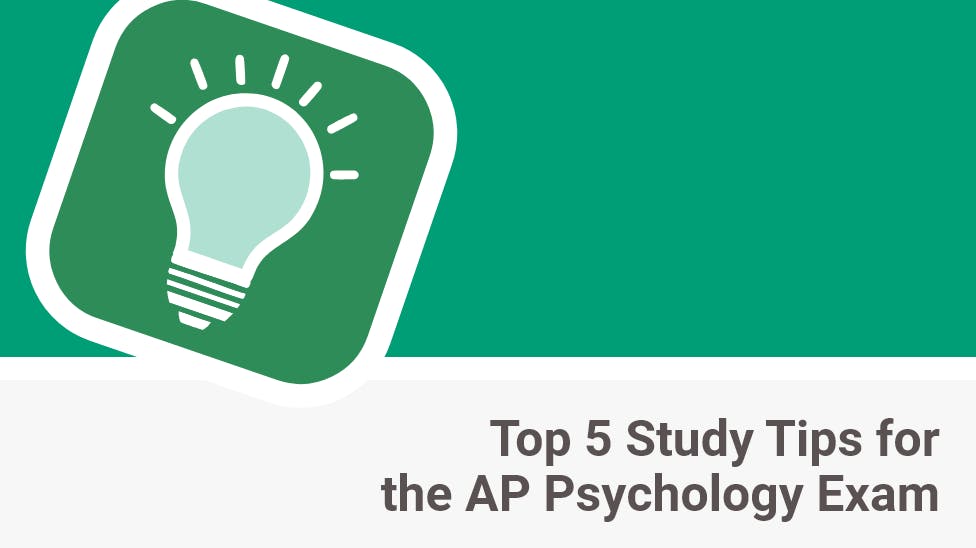Top 5 Study Tips for the AP Psychology Exam
August 14, 2024

Improve your AP score by reviewing our best study tips for the AP Psychology exam. The AP Psychology exam tests your understanding of psychological concepts and your ability to analyze behavioral studies. Preparing for the AP Psychology exam can seem overwhelming, but the following five tips will help you approach the test confidently. We'll show you how to study smarter so you can make the most of your test prep.
AP Psychology Exam Study Tip #1: Psychology is a science.
Psychological researchers use the scientific method to gather data and test hypotheses about the mind and behavior instead of relying on intuition, what the majority of people believe, or “common sense.” Often what people refer to as “common sense” offers contradictory ideas. Regarding attraction, common sense tells us both that “opposites attract” and that “birds of a feather flock together.” Psychological researchers carefully gather data about topics like attraction to reach conclusions rather than relying on intuition or belief. Unit 0 describes in detail how psychologists gather data and test hypotheses. Understanding research methodology is vital to your performance on the exam and your understanding of the science of psychology.
AP Psychology Exam Study Tip #2: Know the psychological perspectives.
Psychological researchers study the mind and behavior from different “perspectives.” Each perspective uses some unique research methods, concepts, and vocabulary to describe and explain thinking and behavior. Knowing the vocabulary and concepts associated with each perspective can help you better understand psychological theories and quickly narrow down possible answers to exam questions. For instance, if a question uses the term classical conditioning, you should be able to immediately identify the question as belonging in the “behavioral” area of psychology and look for answers that include other behavioral terms. The psychological perspectives are introduced in Unit 0 and form the basis for the discussion of personality, psychological disorders, and treatment of psychological disorders found in later units.
AP Psychology Exam Study Tip #3: Know Your Terms.
Psychological terms refer to specific concepts, and it is important that you don’t confuse these terms with “pop” psychological ideas or the casual ways non-psychologists use the same words. For example:
- To a psychologist, people diagnosed with antisocial personality disorder (Unit 5) are not shy or unfriendly, but rather callous and unfeeling toward others.
- “Learning” in psychological terms refers to much more than learning in school and is divided into many specific kinds of learning such as classical and operant conditioning. You can read more about this in Unit 3.
You should make sure that you understand the specific, scientific meaning of psychological terms. Most of the multiple-choice items on the exam (which determine the majority of your final score) measure your ability to apply psychological terminology.
AP Psychology Exam Study Tip #4: Application is key.
The AP Psychology test is designed to measure your knowledge of psychological concepts and ability to apply these concepts. Exam items (especially the free-response questions) usually require you to go beyond defining terms by applying them to a scenario or making connections between different concepts. However, the AP Psychology exam is not designed to measure your writing ability or ability to express your knowledge in creative or unique ways. The measurement goals of this exam are to assess your knowledge of psychological concepts and your ability to apply this knowledge.
AP Psychology Exam Study Tip #5: Use what psychology teaches you about cognition to improve your study habits.
You have been a student for many years, and no doubt you’ve received advice about how to study and have developed your own study habits. Use what psychology teaches you about cognition to improve your study habits. Studying for the AP Psychology exam is an opportunity for you to modify your study methods based on the research findings about the effectiveness of different encoding and recall techniques.
For example:
- Memory research clearly indicates that “distributed practice” (spacing your studying over a span of days or weeks) is much more effective than “massed practice” (“cramming” all your studying just before the test).
- Memory techniques like chunking, mnemonic devices, and context cues can dramatically improve your ability to recall sets of terms and save you hours of study time.
- The information-processing model predicts that focusing on the meaning, context, and application of psychological ideas will increase your ability to recall and use psychological ideas.
- Research indicates that students can (and should) take advantage of “testing effect” (also known as the “retrieval practice”): you should interrupt your reading and studying with frequent small “tests” of your knowledge. Use the practice questions at the end of each Unit to test your knowledge.
AP Biology Resources
- About the AP Biology Exam
- Top AP Biology Exam Strategies
- Top 5 Study Topics and Tips for the AP Biology Exam
- AP Biology Short Free-Response Questions
- AP Biology Long Free-Response Questions
AP Psychology Resources
- What’s Tested on the AP Psychology Exam?
- Top 5 Study Tips for the AP Psychology Exam
- AP Psychology Key Terms
- Top AP Psychology Exam Multiple-Choice Question Tips
- Top AP Psychology Exam Free Response Questions Tips
- AP Psychology Sample Free Response Question
AP English Language and Composition Resources
- What’s Tested on the AP English Language and Composition Exam?
- Top 5 Tips for the AP English Language and Composition Exam
- Top Reading Techniques for the AP English Language and Composition Exam
- How to Answer the AP English Language and Composition Essay Questions
- AP English Language and Composition Exam Sample Essay Questions
- AP English Language and Composition Exam Multiple-Choice Questions
